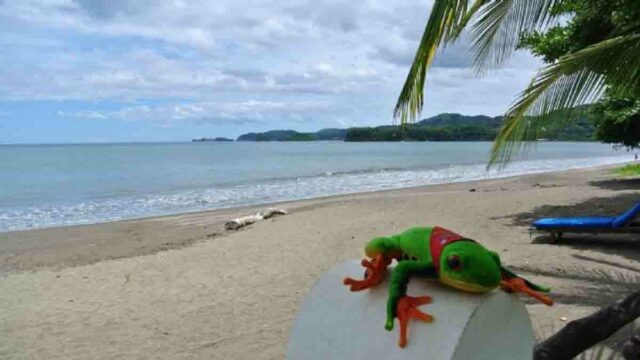The Costa Rican Tourism Institute (ICT) has articulated about twenty measures with the Executive Power, the Legislative Assembly, the banking sector and the private sector to generate the economic recovery of the tourism sector.
One of the fundamental axes of the strategy is the air travel reopening, which began on August 1st with controlled risk management and which, as of November 1st, will be extended to all countries.
This measure is considered a crucial decision to regain the international connections, the confidence of the airlines, that of the travelers and thus reactivate employment in a sector with more than 600,000 direct and indirect depended jobs.
The ICT has assumed a coordinating role and to date can account for the following results:
Measures to adjust health security to COVID-19
Health protocols: as a tangible result of hard, dedicated and joint work, 28 officials of the Costa Rican Tourism Institute (ICT) and 39 representatives of the private sector prepared, in less than two weeks, 16 health protocols for the safe reopening of the same number of areas of the tourism industry affected by the COVID-19 pandemic.
Training: The ICT CAPACITA platform was launched in May and thus has been able to virtually train the national tourism sector in the implementation of the 16 applicable protocols for tourism activities, essential to guarantee the health security of Costa Rica as a tourist destination.
Safe Travels Seal: Costa Rica obtained the Safe Travels or Safe Destination seal from the World Travel and Tourism Council (WTTC), thanks to the implementation of the 16 sanitary protocols for tourism activities.
Measures for the promotion of domestic and international tourism:
Vamos a Turistear: promotion of consumption in national tourism through the launch on July 23 of the campaign “Vamos a Turistear” with special offers for Costa Ricans and residents. This campaign was strengthened through an alliance with the Costa Rican Banking Association, which offers discounts, differentiated payments, redemption of points, financing to one year interest-free term for all cards for consumption in local trips, among other measures, to generate economic options to vacation in the country.
International promotion of the destination: actions in markets of interest have not ceased and at no time were they suspended despite the closure of the airports, given the importance of remaining in a situation where competition to recover international arrivals will be commercially aggressive.
With the reopening of the air border, the promotion of Costa Rica has been intensified, particularly in the face of the high season and taking advantage of our international prestige as a sustainable tourist destination, with limited growth (without crowds) and adding well-being as a transversal axis.
The foundation of the different actions is based on the Only the Essentials campaign, which calls for us to connect with the essential values of life, a pertinent reflection on the health situation.

As part of these communication efforts, the ICT last week gave interviews to NatGeo, which will publish a special of more than 20 pages on Costa Rica in the coming days, and to The New York Times. The Institution also participates actively in specialized tourist forums, such as Skift.
US travel notice: through diplomatic efforts and supported by the General Chancellery of the Republic, interceded with the Government of the United States of America to manage an improvement in the recommendation for travel to Costa Rica, passing it from level 4 ( do not travel) to level 3 (reconsider travel due to COVID-19). At level 3, the US currently ranks most countries in the world.
Measures for the reopening of national tourism activities
Tourist accommodation: as of August 31st, all accommodation establishments – regardless of whether they are located in cantons with an orange or yellow alert – can operate at 100% of their capacity, except in common areas where the capacity must be kept at 50%, i.e. gyms, swimming pools and restaurants.
Vehicle restriction: from October 17th, all vehicles can circulate Saturdays and Sundays from 5 a.m. at 9 p.m., key to incentivize tours and day trips, reactivate the restaurant sector, among others.
Tourist transport: rental vehicles are exempt from the vehicular restriction as well as tourism transport units subject to the special provisions established by the Public Transport Council for the attention of the health situation by COVID-19.
Beaches: since last October 15th all the beaches can be visited from Monday to Friday from 5 a.m. at 10 p.m. and Saturdays and Sundays from 5 a.m. at 9 p.m.
Outdoor tours: from August 1st, tours with outdoor activities are authorized, among which are walks, hiking, canopy, cable cars, raft rides, water recreational activities and aerial recreational activities, all under strict compliance with health protocols.
Convention tourism: since September 9th, meeting tourism can operate with a maximum capacity of 75 people, a figure that does not include the logistics staff who attend events.
Casinos: from October 8th, all casinos that are located in tourist accommodation can operate.
Measures for the reopening of borders
Air opening: from August 1st with controlled risk and from next November 1st it will be extended to all countries in the world. This is a crucial decision to regain the air connection, the confidence of the airlines, that of the travelers and thus reactivate employment. More than 600 thousand direct and indirect jobs depend on tourism.
Maritime opening: the arrival of passengers who meet migratory requirements by sea was enabled in yachts, regardless of where they originated, to the five marinas in the country (Papagayo, Los Sueños, Pez Vela, Bahía Banana and Bahía Golfito). With this, the recovery of 2,500 direct jobs is expected.
Measures to strengthen competitiveness
Jet fuel price: 5% reduction in the price of jet fuel (fuel for airplanes). The price was reduced by eliminating jet fuel subsidies for liquefied petroleum gas, bunker, asphalt, and asphalt emulsion.
The measure was finalized in May through a decree as part of the plan promoted by the government for the reactivation of tourism. It will benefit airlines seeking to regain air connectivity in the country.
Measures promoted by the Economic Council of which the ICT is part
Credit readjustments: as part of the actions promoted by the Economic Council, on March 18th we issued Directive 075-H directed at the commercial banks of the State in order to provide liquidity to households and companies through readjustments loans that contemplate the decrease in interest rates, extension of the term, extensions in the payment of the principal and / or interests for the time that is necessary. The public bank has realigned more than $ 500 million since then for the tourism sector.
Petitions to the state bank: On May 8, Directive 083-H-MIDEPLAN was issued, addressed to the commercial banks of the State, urging them to apply the following measures:
Elimination of the practice of minimum levels of active interest rates (floor rates); both for existing credits and for new credit operations.
Temporary flexibility in the risk assessment of credit operations.
Elimination of the practice, in current and future credit contracts, of applying penalties or commissions for early or extraordinary payments.
Use of endorsements and guarantees to facilitate access to credit, among which will include security interests.
Working capital: as a result of Directive-083 and at the request of the Economic Council, public banks made available ₡ 584,000 million for working capital and guarantees within the framework of the Post COVID-19 Recovery Strategy.
Guarantee Fund: the Central American Bank for Economic Integration and the Government of Costa Rica signed on September 16 the loan contract for $ 300 million that will serve as the basis for the creation of the National Guarantee and Guarantee Fund, for the reactivation economic and support to debtors affected by the covid-19 pandemic. The ladies and gentlemen of the Legislative Assembly await approval.
PYME-Proteger Bonus: The ICT participates by providing information to the Ministry of Labor so that this portfolio can execute the PymeProteger Bonus Program. This is at least US $ 30 million included in the Loan Agreement with the Inter-American Development Bank (IDB) to finance the Program to Protect Jobs and Income of vulnerable populations affected by Coronavirus, for US $ 245 million. This Loan Agreement is in the process of being approved by the deputies of the Legislative Assembly.
Legislative initiatives supported by the ICT

VAT moratorium law: those companies that have a Tourist Declaration, Certificate of Tourism Sustainability, tourist transport and certified guides that are up to date with the requirements established by the ICT are exempt for one more year.
This is a financial breather that allows to maintain the competitiveness of the prices for the next year. This moratorium allows the activities registered with the ICT not to have to raise prices for the coming year, which is key in a situation of recovery from a pandemic.
Long weekends: the ladies and gentlemen of the deputies approved a law that moves four holidays that fall on weekends during 2020 and 2021 to Monday in order to support the tourism sector.
The ICT continues to work in permanent coordination with the Government, legislators and different tourism chambers of the sector, among other actors, for the implementation of additional actions that help to reactivate tourism, the engine of the national economy.

